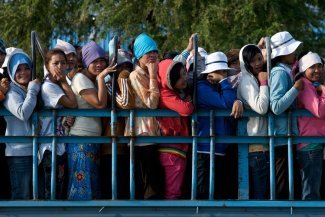US civil rights leader Martin Luther King Jr during the March on Washington for Jobs and Freedom, held on 28 August 1963 in Washington D.C.
This coming Monday marks Martin Luther King (MLK) Day, a federal holiday celebrated in the United States every third Monday in January to honour the iconic civil rights activist’s birthday. But as we celebrate his life and mourn his 1968 assassination, it is important to remember that the fight for a living wage and decent work are a significant part of his legacy and the wider human rights agenda that he served.
When Dr. King delivered his famous ‘I Have a Dream’ speech at the March on Washington for Jobs and Freedom in 1963, he envisioned a world where people would be truly free to experience racial, economic and social justice. A world where all workers have access to decent jobs that allow families and communities to live with dignity and respect. Well before the March on Washington, MLK sought an alliance with the labour movement; for example, in 1961, he addressed the AFL-CIO national convention and called for a need to unite all workers behind “decent wages, fair working conditions, liveable housing, old age security, health and welfare measures, conditions in which families can grow, have education for their children, and respect in the community”.
But what is the significance of MLK’s ‘social gospel’ for today’s business and human rights agenda? What lessons can MLK teach us to help us realise living wages in global supply chains, as well as socio-economic and racial justice in the United States and beyond?
Lesson 1: Political rights are indivisible from social and economic rights and justice
In the 1960s, Dr. King advocated for political, social, and economic equality for all, particularly in his later years as part of his Poor People’s Campaign, which called for a transformation of America from a “thing-oriented society, to a people-oriented society”. MLK knew that racial equality could only be reached if racialised poverty and sub-minimum wages were also addressed: “What good is having the right to sit at a lunch counter, if you can’t afford to buy a hamburger?”
This war on poverty and fight for a living wage is still being fought today. As of 2020, nearly one in four jobs in the United States were low-wage, the highest proportion in the industrialised world. Moreover, Black and Latinx workers are significantly more likely to be stuck in poor, low-wage jobs than white workers. Meanwhile, the racial wage gap (where racialised workers earn less than white workers) remains one of the most persistent features of the US labour market.
But low-wage, essential workers in the US have had enough of bad pay and poor working conditions, as shown by America’s current strike wave and by the large numbers of workers quitting their jobs (particularly those in low-wage roles). Low-wage workers validate MLK’s conviction that one is only free to live in dignity and respect when one has a decent job that affords the basic necessities of life. Hence, political justice needs to be complemented with socio-economic justice.
Lesson 2: Labour rights are the backbone of the fight against worker exploitation
Whether we are talking about the fact that racialised workers in the US, particular immigrant workers, are more likely to experience wage theft (where employers withhold wages or pay below the legal minimum wage, costing workers around US$50 billion a year), or we are looking at modern slavery in global supply chains, the extreme exploitation of workers is as baked into our global economic system today as it was when Dr. King declared that “all labour has dignity”.
But if we want to end the forced labour of China’s Uyghur population picking cotton for our T-shirts, or prevent migrant workers from being unfairly recruited to produce rubber gloves in Malaysia for global health workers, the real fixes of modern slavery require political rights and freedom so that workers can organise and claim their rights. Everyone has the right to work, to free choice of employment, to just and favourable conditions of work, and to protection against unemployment. Everyone, without any discrimination, has the right to equal pay for equal work. This requires governments to legislate, protect and enforce those rights, and for businesses to respect them.
Lesson 3: The right to organise, strike and bargain collectively are essential to achieve sustainable living wages
Dr. King called unions the “first anti-poverty program,” one that “transforms misery and despair into hope and progress”. MLK criticised US employment laws, participated in strikes and addressed many union events. The day before he was murdered on 4 April 1968, MLK delivered his ‘I’ve Been to the Mountaintop’ speech at the Memphis sanitation workers strike, where workers were opposing unsafe conditions, racist supervisors, low wages and union-busting efforts. MLK emphasised the importance of freedom of assembly, freedom of speech, freedom of press, and the right to strike as essential tools to help bring about the equality he envisioned.
Current research shows that industries with strong union membership have higher than average wages. US union membership, however, has declined over the past 20 years from one-fourth of the workforce to just over 10 per cent today. In companies with declining union membership, wages fell at a greater level than in sectors where union membership remained intact. Despite declining union density, the Covid-19 pandemic led in 2020 to the greatest number of strikes, work stoppages and lock-outs seen in the United States since the 1980s. This trend continued in 2021: Kellogg’s factory workers and warehouse workers at Amazon were among the thousands of workers across the country on strike. Amazon eventually came to a settlement with the National Labor Relations Board to allow its workers to freely organise without retaliation, a first for the global tech giant which is known to deploy fierce anti-union measures. And just before the Amazon settlement, the first Starbucks café unionised in the US since the coffee chain was founded nearly 50 years ago. And Kellogg’s, which initially intended to replace its 1,400 striking workers, ultimately agreed to significant wage increases ina new five-year collective agreement.
These big union wins are hugely significant, proving that MLK’s belief in the power of unity, of workers organising and standing up together, is a powerful agent for social change. Moreover, when workers and employers agree together on significant wage increases in a self-sustained collective bargaining process, this raises the bar on wages sustainably for the longer-term.
Lesson 4: It’s time to uplift the legal minimum wage to a living wage
One of the ten demands of the March on Washington was the extension of the federal minimum wage to previously uncovered workers and for it to be increased to US$2 an hour (equivalent to US$15 in 2021 inflation-adjusted). MLK warned about the “gulf between the haves and the have-nots”, but today, inequality is far worse and racial income inequality is ever-present. In the US, the median white household hasa net worth 10 times that of the median Black household. Since Black and Latinx workers are more likely to be poor low-wage workers, raising minimum wages is also an important tool for achieving racial justice.
Low-wage workers have not shared in the gains of the growth of the US economy since the 1960s. In 1968, when MLK was murdered, American minimum wage workers earned US$10.59 per hour (inflation-adjusted), significantly more than today’s US$7.25 federal minimum wage. The US labour movement has been fighting for an increased federal minimum wage of at least US$15 an hour since 2012, but the‘Fight for $15’ is no longer believed to be sufficient and campaigners are eyeing US$18 per hour.
Globally, from the Netherlands to Cambodia to South Africa, unions are also campaigning for an increase in legal minimum wages, to raise the bar so that all workers can earn at least a living wage.
Lesson 5: Expand living wage efforts to global supply chains
What does MLK’s March on Washington have in common with the October 2021 Washington D.C. rally for Uyghur rights in China, led by NBA basketball player Enes Kanter? The demand that everyone is treated with respect and dignity, and can live free from repression, discrimination, and exploitation. To MLK, the demand for justice did not stop at national borders, famously stating that “injustice anywhere is a threat to justice everywhere”.
In line with this thought, a global coalition of trade unions and civil society organisations campaigned last Black Friday (25 November 2020) to Make Amazon Pay, while Amazon workers in 20 countries and across all areas of its supply chain went on strike or protested for better wages and better working conditions.
Though companies are increasingly committed to supporting a living wage for workers in their global supply chains, most workers and farmers in sourcing countries find themselves earning below-poverty-line incomes. It should be business as usual for global companies to support living wages of workers and the living income of farmers via their own purchasing practices, by sourcing products for a fair price, and paying living wage premiums. At the same time, related workers’ rights issues must also be addressed, such as the elimination of child labour and modern slavery. And an enabling environment should be provided, wherein legal minimum wage increases are supported and mature industrial relations are developed, leaving workers free to organise, join trade unions and bargain collectively for a living wage.
Living wages are now a central topic on the international business and human rights due diligence agenda. Let’s make living wages ‘business as usual’ and ensure that governments and business take their responsibility to protect and respect workers’ rights and remedy violations seriously. Wherever workers are, whatever their status, all labour has dignity, and all workers deserve a prosperous life, liberty, and the pursuit of happiness.













